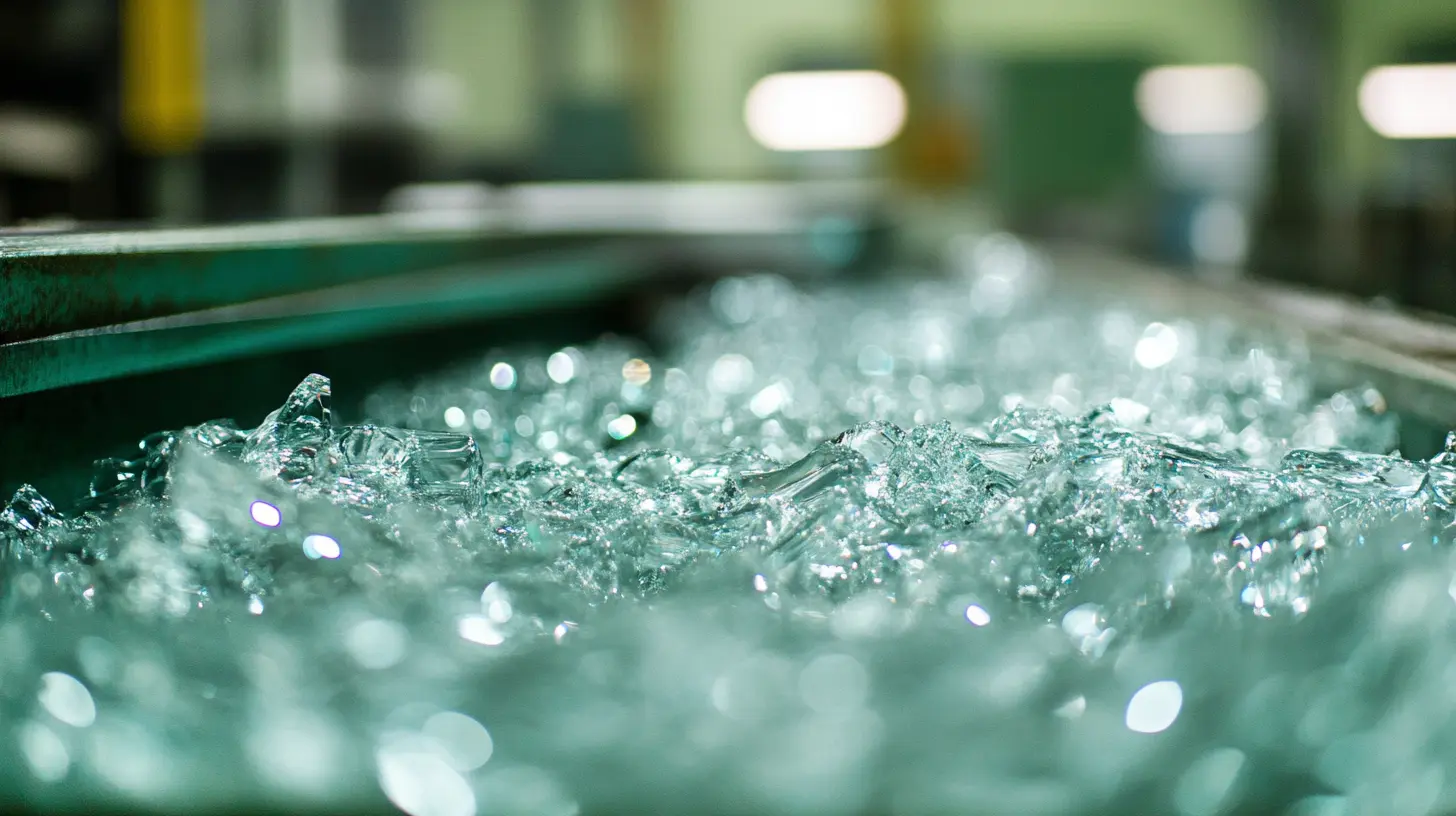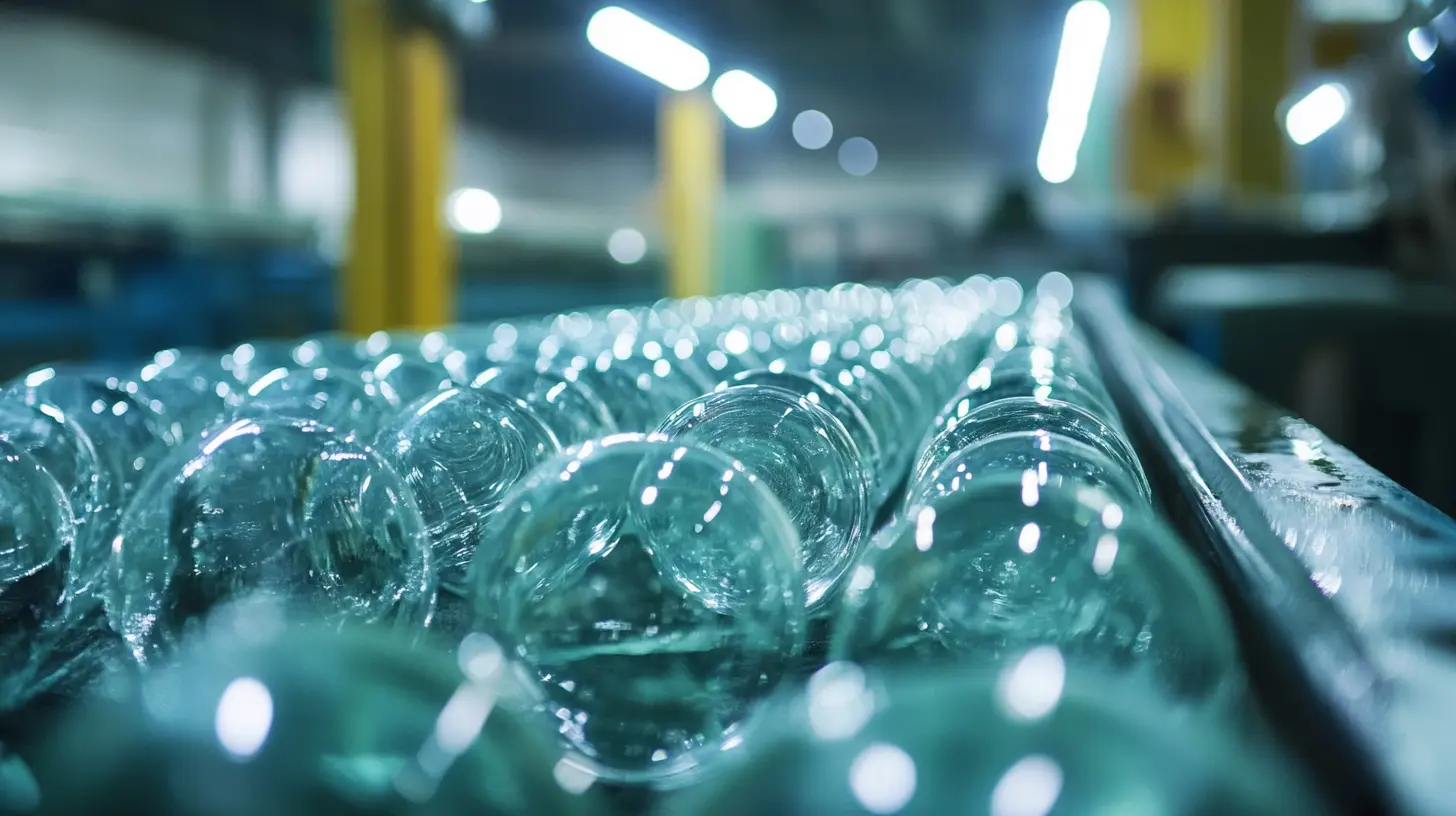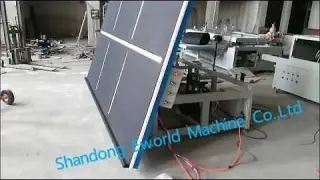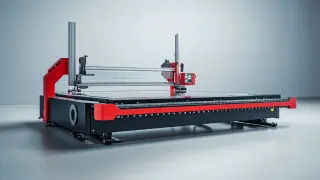In today's world of glass manufacturing which is ever changing and evolving at the speed of light, it is very important to find reliable manufacturers for essential equipment such as Glass Loading Machines. This would ensure the maximization of quality, efficiency and productivity especially in the wake of expansion of the industry worldwide where one easily gets confused about right partner choosing with so many options available. Thus this article will give top tips on sourcing Glass Loading Machines to help push businesses through the tangled web of international procurement while highlighting the importance of keeping up with reputable manufacturers.
Founded in 2014, Shandong Eworld Machine Co, Ltd has become a really bright name in the high and new technology enterprise that specializes in developing and selling a series of automatic glass machines including such pioneering Glass Loading Machines. Keeping the track of excellence and credibility for the past numbers of years, Eworld comics such key issues and strategies for successfully searching glass machinery internationally. Eworld teaches the companies on the very best way that could be followed in drawing important inferences from that industry and best practices that are being followed so as to make an informed decision in the search of the right manufacturer to help them meet operational needs.

Understanding the Importance of Reliable Manufacturers in the Glass Industry
In the glass market, access to trustworthy manufacturers is an important consideration in meeting standards and obtaining consistent quality. The glassware market exhibits progressive expansion wherein colored glass and fire-resistance glass are expected to garner enormous share; thus, manufacturers are required to act reliably. This positively affects product quality and increases efficiency in regard to fulfilling rising demands across several markets worldwide. The market for colored glass is expected to grow dramatically, from $4.48 billion in 2023 to an estimated $6.5 billion by 2032. Therefore, businesses need to build a strong relationship with trusted suppliers. Partnering with reliable manufacturers secures the supply chain theory and minimizes the risk of setbacks owing to delays or inferior product quality. Furthermore, these partnerships create an opening for new technologies and practices, which are the essence of competitiveness in a changing industry. As companies seek manufacturers, the suppliers' history and capabilities will be of primary importance. Hence, quality assurance and sustainability practices are important to evaluate. This diligence in choosing manufacturers will define the future of the glass industry, as material availability is probably important to future growth and commerce.

Key Features to Look for in Glass Loading Machines
In sourcing glass loading machines from different countries, various key aspects must be observed to help ensure capacity, safety, and efficiency in your operations. One of the more stern considerations relates to the capacity of the machine. It must hold the volume of glass intended for handling without obstructing the workflow. Speed, a vital consideration in this modern fast-paced world, equates to productivity; faster the loading means higher productivity, which works well to meet deadlines and enhance overall output.
Another important criterion would be the technology used to make the glass loading machines. Advanced automation and robotics contribute to higher precision and less manual handling, which helps minimize the risk of breakage while loading. And make sure you look for machines with adequate safety features, such as emergency stop buttons and guards, to protect your workers from possible risks while loading heavy glass.
Durability and build quality should also be prime in your consideration set. Machines fabricated from materials of the highest excellence withstand industrial hardships, which ordinarily results in better return on the investment. Most importantly, consider after-sales services and the availability of spare parts; a company providing solid support is extremely important for the maintenance of your glass loading systems and minimizing downtime.

Researching Global Markets: Where to Start Your Search
Sourcing glass loading machines around the globe begins with an understanding of the international markets and really is an essential first step. The global container shipping trade volume increased to 201 million TEUs in 2023, recording a modest growth of about 0.3% year-on-year. Such low growth, coupled with the global container shipping trading index touching 123.4 in December-a 7.3% growth over the previous year-indicates strong recovery and heightened global trading activity. This growth is vital for manufacturers and suppliers building goods; the glass production industry is one such area where reliable logistic service for sourcing and distribution is vital.
To continue the efforts of seeking reliable manufacturers, looking into the import-export trends in important marketplaces should be uncluttered from the start. Particularly important are regions with a good history in glass and machinery manufacture, notably Europe and parts of Asia. Using industry-specific reports that provide market trends and supplier performance insights would give that extra edge to backing your decisions. As an example, insight into the competitive environment would help address who the key manufacturers are that comply with quality limitations and also have proven flexibility in changing global supply chains.
Approaching potential suppliers at trade fairs and industry conventions would also help provide insights into the suppliers. These fairs often highlight the latest technology and give the opportunity to start direct communication with manufacturers. Likewise, studying customer reviews and case studies will result in deeper knowledge regarding the reliability and performance of potential partners. With a boom in global trade in 2023, having extensive market knowledge will lead to a high-level strategy for sourcing glass loading machines.

Evaluating Manufacturer Credentials and Experience
The discussion above outlines all the points that can act as a guide for properly sourcing glass loading machines on a worldwide basis because it lays considerable emphasis on manufacturer credentials and experience.
Smithers Pira published a report demonstrating that the global glass manufacturing market was valued at USD 129 billion in 2021, thereby suggesting some strong growth in the industry along with an increasing need for trustworthy machines. Hence, machines for glass loading should be manufactured by firms blessed with a successful history in manufacturing glass loading machines of the best quality.
In assessing the credentials of a manufacturer, it is important to look at certifications and commitments to industry regulatory standards. More specifically, ISO 9001 ensures a manufacturer's adherence to quality management principles and, thus, signifies their commitment to continuous improvement and customer satisfaction. Furthermore, it is often said that the more established the market player, typically with at least over a decade of experience, the more trustworthy they would be as they have easily adapted to the technology advances and market ups and downs.
As a second option, it is always advised to evaluate the customers' testimonials and case studies. According to a survey by IndustryWeek in 2023, 76% of manufacturing professionals said they prefer suppliers that have existing relationships with clients and provide past successful implementations. This means that, aside from just looking into the credentials, selecting an OEM with ample experience and positive client feedback allows the customer to take some risks off the table, which makes sure that they would be getting a glass loading machine that is capable of sustaining themselves in the present and in the future.
Assessing Quality Standards and Certifications in Machinery
When obtaining glass loading machines from international manufacturers, the assessment of quality standards and certifications is generally one of the foremost considerations. One must understand the varying applicable international standards for production in regard to machinery: ISO certifications indicate high quality and safety standards. Manufacturers with such certifications assure quality and stand as signals of reliable and consistent production processes. Buyers should consider researching these certifications thoroughly, as this ensures that machines are within the expected global quality norms.
Another key factor to be taken into account is whether the manufacturer complies with the relevant industry regulations. CE marking in Europe and UL certification in America are indicators of a product's adherence to safety standards. In fact, these certifications help to insure against risks associated with equipment failures, with safe functioning in various environments. The relations with manufacturers who advocate for such standards directly bolster the confidence in the procurement process.
Furthermore, the buyer needs to be informed about the production procedures and the quality control measures that are applicable in the manufacturer. Always, these inquiries can lead to a request for the documentation of their processes or, even better, a site inspection of the manufacturer's factory, whenever feasible. Inquiries from the manufacturers about their quality assurance procedures will allow insight into how committed they are to providing safe and trustworthy machinery. Once buyers are well-informed about quality standards and certifications, they will be able to purchase machinery that will perform in their production lines for years.
Effective Communication Strategies with Suppliers
Effective internal communication is imperatively important when organizations are bridging the gap with manufacturers around the world for such commodities as glass loaders. It was revealed in a recent study by the World Trade Organization that about 70 percent of international trade failures seem to result from communication challenges. Thus, providing strong confirmation that having a dialogue is not negotiable to address problems.
Attending to the cultural dimensions of business relationships can help create an understanding between organizations, thereby enhancing cooperation and efficiency. If you were to take an example, the Germans champion honest yet direct talk compared to the Asians, who simply prefer talking indirectly to the point. Consequently, matching communication preferences is a great step forward in establishing a relationship-laden rapport.
Supply chain communication can also be improved multifold through the employment of technologies and digital platforms. According to a study conducted by the Global Manufacturing Network, companies that employed video conferencing and other collaborative tools saw a 30% decline in misunderstandings and an increase in clarity of operations with their global partners. Not only does this digital approach help save time, but it also aids in the documentation and error minimization of project specifications and lead times.
Establishing frequent updates and loops to enhance partnerships and project alignment is highly beneficial for any collaborative effort. A report released by the Institute for Supply Management demonstrated that companies that placed structure in their communication lines showed a remarkable reduction in lead time by 25%. By involving the suppliers proactively through this, companies can better understand the intricate features of the global sourcing system so that best practices in production and quality levels can be achieved.
Negotiating Contracts and Terms for Smooth Transactions
Negotiation for contracts and terms for the sourcing of glass loading machines on a global scale is imperative for securing transactions and conducive partnership development. To start, the specifications and expectations for the machine in question must be defined clearly. Providing descriptions and requirements and further augmenting them with relevant documentation will minimize misunderstandings. An elaborately prepared contract can act as a shield for the parties concerned and lay a baseline for judging the standard of the equipment to be supplied.
Once specifications are agreed upon, focus on working towards best payment terms. Discussing deposits, installments, and payment timelines directly impacts cash flow management. Use leverage in your negotiations; knowledge of the manufacturing market allows you to negotiate from strength. And feel free to negotiate terms that protect your interests such as warranty clauses and maintenance support; such terms can often be the deciding factor between a good and a great manufacturer.
Finally, whenever you are working on the contract, always ensure that both parties mutually agree on delivery timelines and logistics. Delays in shipments can definitely cost a fortune, meaning it is fundamental to set clear terms on the delivery schedule and penalties for non-compliance. Enhanced transparency in communications during the entire process will also build trust and foster collaboration. By doing this, you will be perfectly set up for a fluent transaction and for building a strong foundation for a very successful long-term relationship with your suppliers worldwide.
Leveraging Technology for Efficient Sourcing and Collaboration
The infusion of technology in sourcing process is of utmost import in this era of digital transformation for sectors such as glass loading machine manufacturing. This kind of artificial intelligence is what recent developments in institutions like Tianjin University promise regarding procurement strategy. This underscores how technology can be employed to enhance efficiency and accuracy in sourcing. Advancing AI systems, such as DeepSeek, enable organizations to save time spent on supplier selection and efforts to make good decisions by harnessing data analytics and automation.
In this way, one-third of them called this rolling park as joining with global manufacturers becomes digital portals intended to make communication open and transparent. Real-time data sharing enabled by technology leads to winning better deals and establishing a more robust partnership. As markets evolve, it should be on strengthening partnerships with reliable manufacturers as well as building an integrated ecosystem to respond more quickly to market changes.
According to Xin Fang Sheng, building various scenarios for industrial procurement would improve the operational capacities even more. By improving how sourcing is approached, organizations will be able to navigate the complexities and nuances of the global supply chain and remain competitive and responsive to market needs. A technology-forward approach is what modern procurement is about for a company to not only survive but thrive in the fast-paced world.
FAQS
Reliable manufacturers are crucial for maintaining high standards, ensuring consistent quality, and enhancing operational efficiency, which is essential to meet the increasing global demand for glass products.
The market value for colored glass is projected to rise from $4.48 billion in 2023 to an estimated $6.5 billion by 2032.
By partnering with trusted and reliable manufacturers, companies can mitigate risks associated with delays or inferior products, ensuring a consistent supply chain.
It's important to assess various certifications such as ISO certifications, CE marking in Europe, and UL certification in the United States to ensure adherence to quality and safety standards.
Buyers can evaluate a manufacturer's commitment by researching their quality control measures, requesting documentation of their processes, and engaging them in discussions about their quality assurance protocols.
Key considerations include clearly defining equipment specifications, negotiating payment terms, including warranty provisions, and ensuring agreement on delivery timelines and logistics.
Clear delivery terms help prevent delays that can lead to significant losses, ensuring that both parties understand the timelines and any penalties for non-compliance.
Conducting thorough research helps buyers ensure they are investing in high-quality machinery that meets global standards, thereby enhancing trust and reliability in their procurement decisions.
Compliance with industry regulations, as indicated by certifications, helps mitigate risks associated with equipment failure, ensuring that the machinery operates safely and effectively.
A transparent communication channel fosters trust and collaboration, which are essential for successful long-term partnerships between buyers and manufacturers.

Home
About Us
Products
UPVC PVC Window Machine
Aluminum Window Machine
Glass Cutting Machine
Glass Edging Machine
Insulating Glass Machine
Glass lifting machine
Glass Washing Machine
Glass Laminating Machine
Glass Sandblasting Machine
Glass Drilling Machine
CNC Glass Working Center
CNC Non-Metal Cutting Machine
The Other Glass Machinery
Application
Download
News
Contact Us








